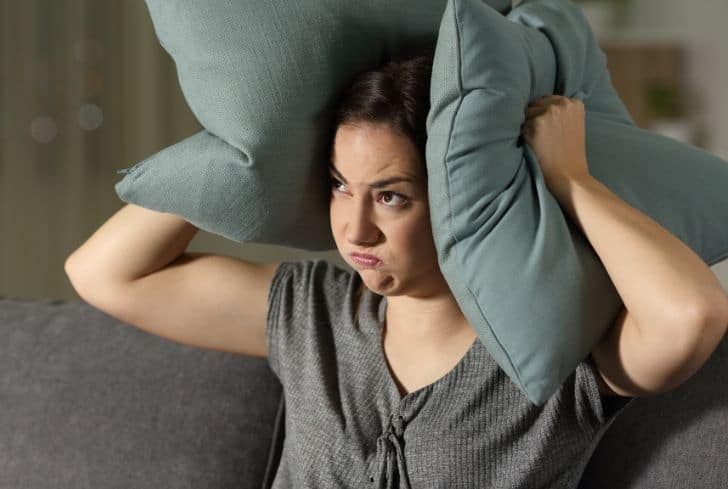Noise pollution refers to an undesirable sound or sound, which generates horrible discomfort on the ears. It is measured in decibels (dB) and sound levels beyond 100 dB can cause permanent hearing loss.
Noise pollution is a huge problem because it creates discomfort, interferes with an individual’s peace of mind, and lessens one’s quality of life. For instance, noise can disrupt sleep and prevent one from getting a rejuvenating rest due to the high sound vibrations.
Noise pollution is a relative thing. In a city, it’s a jet plane taking off. In a monastery, it’s a pen that scratches.
~ Robert Orben
What are the Sources of Noise Pollution?
Globally, the source of outdoor noise is mainly caused by machines, transport, and propagation systems.
The origins of noise include aircraft, jet planes, trains, buses, automobiles, motorcycles, ships, trucks, construction equipment, electrical machinery and gadgets, electrical generators, lawnmowers and leaf blowers, home appliances, explosions, loud music, ringtones, and people.
What are Various Effects of Noise Pollution?
- The constant exposure to loud noises can damage eardrums and cause loss of hearing. The sensitivity of eardrums to pick up small sounds also reduces.
- Excessive noise pollution can have harmful effects on humans, animals, trees, plants, and marine life, constantly exposed to it.
- Noise pollution has many negative effects on the health and wellbeing of humans. It can increase blood pressure and heartbeat, causes heart attacks, cardiovascular and psychophysiological effects, headache and sleep disturbance, impaired cognitive functioning, increases stress level, reduces performance, fatigue, and shows signs of aggressive behavior, provokes annoyance responses and changes in social behavior.
- Loud noise causes interference or disturbance in conversations, communications, sleep, reproduction, and many other aspects of life that disrupt or diminish one’s quality of life.
- Noise pollution is becoming so much ubiquitous that it is threatening biodiversity. Loud noise also affects pets and other animals. If they are exposed to loud noises for a longer duration, they can behave more aggressively.
- Human-made sources can bother marine life with a fatal condition commonly known as ‘the Bends’ and pose a significant long-term threat to aquatic species like dolphins, whales, fish, and others.
“According to the International Programme on Chemical Safety (WHO 1994),
“An adverse effect of noise is defined as a change in the morphology and physiology of an organism that results in impairment of functional capacity, or an impairment of capacity to compensate for additional stress, or increases the susceptibility of an organism to the harmful effects of other environmental influences. This definition includes any temporary or long-term lowering of the physical, psychological or social functioning of humans or human organs.”
25+ Simple Steps to Reduce Noise Pollution
Noise pollution also affects marine and wildlife animals to the same degree it affects humans. These days, noise is almost everywhere especially in urban and city areas influenced by transportation activities such as airports, traffic and railroads, industrial manufacturing, construction works, and concerts.
However, there are numerous practical ways to reduce noise pollution. Here are 25+ easy steps we can take to reduce noise pollution.
1. Close the Windows
Reducing the amount of noise entering into our homes and buildings is possible by simply closing the windows. It keeps away annoying sound. The best thing would be to only open windows during the quieter times of the day, most probably late in the evenings.
2. Put on Earplugs
Wearing earplugs is a cost-effective solution for reducing noise pollution. A pair of earplugs can be worn while sleeping or at any other time of the day when you want to reduce the amount of noise hitting your eardrums.
Earplugs have their health benefits, especially for those who wish to have a healthy sleeping habit in noisy areas.
3. Improve your Insulation
Insulation measures are some of the primary and most practical ways to reduce noise pollution at home. It’s an art of soundproofing, which helps in blocking the sound vibrations and noise.
By improving insulation, it means installing soundproofing materials on the walls, ceiling, and even on the floor. Using double-pane windows and weather-stripping in your home can aid in absorbing noise and work as added insulation saving energy bill.
4. Invest in Noise-Canceling Headphones
The majority of people may not realize this, but sound-canceling headphones are good for reducing noise pollution. It’s essentially important for industrial and construction workers. The noise-canceling headphones filter the unwanted noise well before it reaches the ears.
5. Do Wall-to-Wall Carpeting
Wall-to-wall carpeting comes in as another practical and straightforward way of reducing noise pollution. This kind of arrangement goes a long way in lowering incoming noise into our homes or offices.
6. Install a Fence
It may sound extreme, but it qualifies as a practical way to reduce noise pollution. Noise is produced by strong sound waves or vibrations, which can be significantly reduced by barriers.
By installing a fence, you’ll be creating a barrier that absorbs the strong sound waves or vibrations, thereby reducing noise pollution around your office or home.
7. Be Creative with the Office or House Layout
One way to reduce noise in the house or an office setting is to get innovative with the general layout or design. For instance, noisy machines can be placed in areas that are not close to the sitting/resting or working areas.
8. Invest in Noise-Friendly Flooring
Floors can offer remarkable ways of reducing noise pollution. However, it depends on the type of floor you have in your place. Carpeting, for instance, usually reduces a substantial amount of noise, but better results can be achieved by the use of noise-friendly flooring like vinyl.
Vinyl is a resourceful alternative to carpeting and delivers better in reducing noise pollution because of its sound-absorbing qualities.
9. Invest in Sound-Friendly Furniture
Furniture is excellent sound absorbers as they reduce echo and sound vibrations. Therefore, sound friendly lounge chairs, bookshelves, couches, and cabinets can affect the acoustics of open spaces.
For instance, in the case of a noisy neighbor, put a big bookshelf against the wall to reduce the noise coming from their house or building. Also, use soft furnishings such as rugs, carpets, and wall hangings, which reduce sound.
10. Use of Modern Acoustic Wall Panels
Not all wall panels incredibly serve well at reducing noise pollution. Because of technological advancements, there are modern designed acoustic wall panel options available in the market that can effectively reduce noise pollution.
11. Turn off Electronic Devices or Reduce the Volume
Game systems, computers, Hi-fi systems, and televisions can contribute to noise pollution when on high volumes. The solution is to turn them off when not in use and also keep them on moderate volume to reduce noise pollution.
Besides, by turning them off, you’ll also be saving electricity costs. Place padding under noisy equipment to reduce noise, such as blenders.
12. Use Noise Absorbents in Noisy Machinery
If some pieces of machinery are creating noise due to vibrations, you can check the noise by applying some noise absorbents to reduce noise.
13. Do Frequent Lubrication and Better Maintenance of Machinery
Proper lubrication and better maintenance of machines are beneficial practices to reduce noise pollution and improve efficiency. As lubrication reduces friction between movable parts, it helps to reduce noise.
14. Plant Trees
Trees have been established to be effective in reducing noise levels within urban settings, around major highways, and even at the places, we stay.
Therefore, numerous plants and trees in an area mean less noise pollution. In addition to that, trees have various aesthetic advantages and improve air quality.
15. Have a Dedicated Quiet Space
Having a dedicated quiet space can pay off whenever we want to escape from noises that make us feel uneasy and affect the quality of our life. Quiet spaces can guarantee as much as 100% soundproof areas.
16. Install Cubicles and Wall Partitions
Installation of wall partitions and cubicles in places such as offices with ample free space and big rooms at home reduces the overall indoor noise. Even with low-level installation, cubicles and wall partitions proved to be very useful noise absorbers.
17. Shut the Door
Shutting the door keeps away unpleasant sounds, especially if you have noisy neighbors. If there are appliances that produce loud noise such as dishwashers, blenders, and washing machines, you can have them run in separate rooms and shut the door to seal off the noise.
18. Cancel or Mask the Noise
Canceling or masking the noise is one of the most straightforward and practical techniques for reducing noise pollution. It is achieved through the creation of peaceful and soothing sounds to cancel the awful ones.
It can simply be done by turning on a fan or hanging wind chimes. For the majority of people, it may seem contradictory, but it is a proven effective method of masking or canceling the horrible and bothering sounds.
Furthermore, there are white noise machines that can make canceling or masking easier.
19. Move or Choose a Home in Noise-Free Areas
Moving away from noisy areas can also qualify as a practical way of reducing noise pollution. It may sound exaggerated, but moving from areas such as airports, train stations, industrial districts, and major highways can reduce noise levels considerably.
20. Replace Old Automobiles with New Ones
Old automobiles are a significant source of noise pollution. They create unappealing and sometimes deafening sounds. Their replacement with new ones not only reduces noise pollution but will also lower the emission of soot and other toxic substances into the atmosphere.
21. Create Awareness and Education on the Consequences of Noise Pollution
Creating awareness of noise pollution and its effects on both humans and wildlife can generate positive outcomes in efforts to reduce noise pollution.
Perhaps if most people could be aware that noise pollution can lead to hearing loss and mental stress, then the majority will invest in ways to reduce noise pollution.
22. Declare a “No Horn Zone” in Hospital, School, and Residential Areas
Horns from trucks, buses, and cars produce a considerable degree of noise pollution and as such, the introduction of no horn zone can help reduce noise pollution in hospitals, schools, and residential areas.
23. Let’s all be Good Neighbors
Being a good neighbor means maintaining awareness of loud music, barking dogs, or loud parties, among others. Keeping these on a check can make your neighbor follow the same, which eventually contributes to an easy and practical way of reducing noise pollution.
24. Put Pressure on the Relevant City or Governing Authorities to Introduce Noise Regulation Policies
Governing and city authorities hold the power to introduce policies that can help reduce noise pollution. The laws should limit the amount of noise in public and private places to cut noise pollution.
The policies can also be integrated into transportation network construction and activities such as low-noise road surfaces, low-noise tracks, redesigning street spaces, enforcing speed limits, and reducing traffic volume.
25. Do Regular Checking of Noise Levels
Keeping the noise level within the limit requires frequent verification of noise level in an industrial complex and indoor. Therefore see to it that regular checking of noise level is done.
26. Notify Authority for Breaking Noise Rules
You can notify government agencies if someone in a neighbor is not following rules and regulations regarding noise levels and also not maintaining the noise limit set by the city authority.
27. The Use of Calming Green Waves
These are the highway and noisy areas (such as airports, train stations, and industries) sound insulation measures that can help absorb the huge sounds produced by the operating machines.
References:







